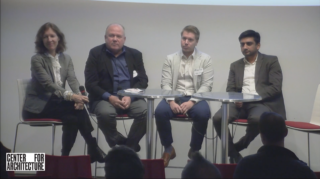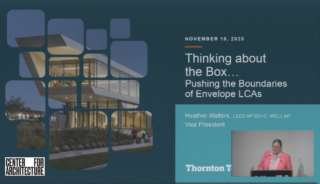Info
-
Co Chairs
-
Naciem Nowrouzi, AIAArup
-
Advisory Committee Members
-
Michael Buesing, AIA, LEED AP, CPHD
-
David J. Goldstein, PE
-
Satpal Kaur, RIBA I, RIBA II, CPHD
-
David Levine, AIA, LEED AP BD+C, CPHC
-
Risa Rottenberg, M.Arch, BECxP, CxA+BE
-
Cheryl M. Saldanha, P.E., CPHC.
-
-
Contact
Topics
-
February 10, 2022
We are excited to kick off the Building Science Committee at AIANY. Our mission is to bring together leaders and experts from across the design and construction communities to promote the learning and effective application of building science principles as a means to achieving better performance and resiliency from our built environment. Our industry is facing many critical challenges, from reducing harmful emissions to improving the health and well-being of occupants while increasing resilience in the face of severe weather events. Addressing these issues requires a multidisciplinary approach and collaboration that crosses the typical boundaries between architecture and engineering professionals. We look forward to building this committee into a valuable resource and open forum to promote building science awareness and knowledge. Our initial goals and areas of focus are described in more detail below.
Goals
Industry Outreach:
We aim to organize “Building Science” focus group meetups involving architects, engineers, contractors, educators, manufacturers and policy makers as an informal way to share experiences, exchange technical information and collaborate in educating the AEC industry on building performance, technical issues and best practices by forming public programs/events around the topics below.
Promoting Research:
The focus group will collaborate with the practitioners and industry groups to develop research topics and raise universities’ awareness of the industry needs. Facilitate industry-university collaboration and a fostering culture between the firms and researchers. Supporting researchers by creating a platform to disseminate their studies and results.
Impacting Education:
The focus group will engage the Architectural and Engineering programs to spearhead the efforts in university-industry cooperation and promote new curriculums based on industry needs, and subsequently provide opportunities for the faculty, students, and practitioners to take part and expand their knowledge.
Topic Areas
While building science covers a range of important topics, we have identified the following four topics as our initial areas of focus for this committee.
Retrofitting Existing Buildings:
With the majority of buildings that will exist in 2050 already standing today, the need for retrofitting existing buildings to meet higher performance standards is one of the major challenges our industry faces today. A thorough understanding of building science and the impacts that changes to any individual system can have on the rest of the building is critical in order to achieve successful outcomes on retrofit projects.
Indoor Air Quality and Thermal Comfort:
Indoor air quality and thermal comfort have always been critical factors for the health and well-being of building occupants. However, the current coronavirus pandemic has brought these issues to the forefront and highlighted the health and comfort deficiencies in much of our built environment, particularly for vulnerable populations. This committee will emphasize the application of building science principles to create indoor environments that promote the health and productivity of building occupants.
Resilience to Extreme Weather Events:
Climate change has increased the incidence of extreme weather events, and the trend is likely to continue for decades into the future. The built environment must adapt to better protect life and property in the face of such events. Building science will play a critical role in ensuring that new and existing buildings have the resilience and durability to withstand the impacts of climate change and continue to provide safe and reliable indoor environments both during and after extreme events.
Net-Zero Energy/Carbon Buildings:
Net-zero energy and net-zero carbon buildings will soon be the standard for new construction, and will eventually be required for existing buildings as well. This has major implications for the way buildings are designed, built, and operated. This committee will explore the various ways that net-zero construction will impact the flow of energy, air, and water throughout the building, as well as the selection of low embodied carbon materials.
As the new building science committee gets off the ground, we welcome feedback and involvement from the design, construction, and academic communities. Please contact us with any comments or to express interest in participating in future committee meetings, activities, and events.
Past Events
-
Thu, 4/4/24, 12:30pm
-
Thu, 1/18/24, 3:00pm
-
Fri, 11/10/23, 8:30am
-
Tue, 10/17/23, 10:00am
-
Tue, 9/19/23, 5:30pm












